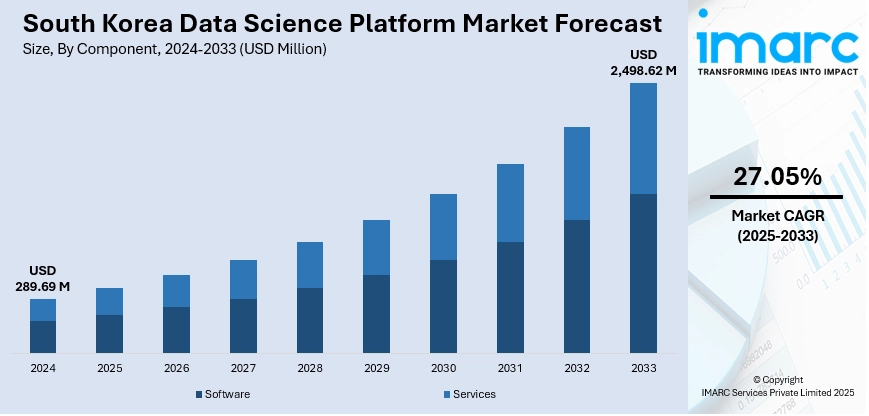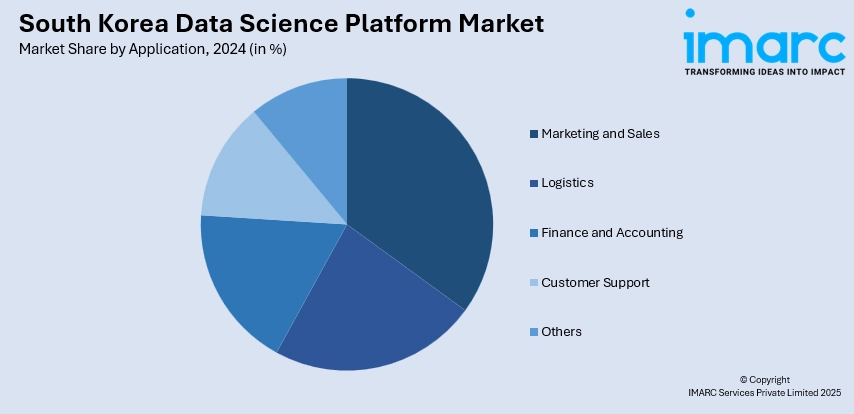
South Korea Data Science Platform Market Size, Share, Trends and Forecast by Component, Application, Vertical, and Region, 2025-2033
South Korea Data Science Platform Market Overview:
The South Korea data science platform market size reached USD 289.69 Million in 2024. The market is projected to reach USD 2,498.62 Million by 2033, exhibiting a growth rate (CAGR) of 27.05% during 2025-2033. The market is propelled by the demand for advanced analytics tools in industries such as healthcare, finance, and manufacturing. In addition, the strong digital infrastructure of the country, digital transformation initiatives led by the government, and expanded adoption of AI and big data technology are leading to deployment. Moreover, investments in smart city projects and IoT device proliferation are enhancing demand for scalable and integrated data science solutions, further expanding the South Korea data science platform market share.
|
Report Attribute
|
Key Statistics
|
|---|---|
|
Base Year
|
2024
|
|
Forecast Years
|
2025-2033
|
|
Historical Years
|
2019-2024
|
| Market Size in 2024 | USD 289.69 Million |
| Market Forecast in 2033 | USD 2,498.62 Million |
| Market Growth Rate 2025-2033 | 27.05% |
South Korea Data Science Platform Market Trends:
Surge in AI Integration across Enterprise Operations
The market is witnessing a strong surge in the integration of artificial intelligence (AI) across enterprise operations, reflecting the broader national shift toward intelligent digital transformation. According to an industry report, the South Korea artificial intelligence market was valued at USD 3.12 Billion in 2024 and is projected to reach USD 30.00 Billion by 2033, expanding at a robust CAGR of 26.60% from 2025 to 2033. This rapid growth underscores the increasing demand for AI-enabled data science tools that support real-time analytics, machine learning model development, and advanced data visualization. Moreover, organizations in sectors such as manufacturing, finance, healthcare, and logistics are increasingly embedding AI-driven models into their data science workflows to optimize decision-making, automate complex processes, and generate predictive insights. In addition, AI capabilities such as natural language processing, machine learning, and computer vision are being harnessed through data science platforms to enable more accurate forecasting, real-time analytics, and customer behavior modeling. Besides this, the demand for AI-integrated platforms is expanding as businesses strive to gain competitive advantages through advanced data modeling and intelligent automation, reinforcing the pivotal role of AI within the evolving data science ecosystem in the country.

To get more information on this market, Request Sample
Growing Emphasis on Industry-Specific Data Science Solutions
The adoption of industry-specific data science platforms, driven by the need for domain-tailored analytics and regulatory compliance, is positively impacting the South Korea data science platform market growth. Companies across sectors such as telecommunications, automotive, and pharmaceuticals are deploying customized platforms that align with their unique operational requirements and data structures. Furthermore, players in the market are responding by offering verticalized solutions equipped with pre-built algorithms, domain-specific data connectors, and integration capabilities for industry-grade systems like ERP and SCADA. The trend is also supported by the growing pool of local data scientists who possess both technical expertise and industry knowledge, enabling more effective model development. As a result, sector-focused platforms are becoming essential tools for driving operational efficiencies and innovation in a market increasingly characterized by specialization.
South Korea Data Science Platform Market Segmentation:
IMARC Group provides an analysis of the key trends in each segment of the market, along with forecasts at the country and regional levels for 2025-2033. Our report has categorized the market based on component, application, and vertical.
Component Insights:
- Software
- Services
The report has provided a detailed breakup and analysis of the market based on the component. This includes software and services.
Application Insights:

- Marketing and Sales
- Logistics
- Finance and Accounting
- Customer Support
- Others
A detailed breakup and analysis of the market based on the application have also been provided in the report. This includes marketing and sales, logistics, finance and accounting, customer support, and others.
Vertical Insights:
- IT and Telecommunication
- Healthcare
- BFSI
- Manufacturing
- Retail and E-Commerce
- Others
The report has provided a detailed breakup and analysis of the market based on the vertical. This includes IT and telecommunication, healthcare, BFSI, manufacturing, retail and e-commerce, and others.
Regional Insights:
- Seoul Capital Area
- Yeongnam (Southeastern Region)
- Honam (Southwestern Region)
- Hoseo (Central Region)
- Others
The report has also provided a comprehensive analysis of all the major regional markets, which include Seoul Capital Area, Yeongnam (Southeastern Region), Honam (Southwestern Region), Hoseo (Central Region), and others.
Competitive Landscape:
The market research report has also provided a comprehensive analysis of the competitive landscape. Competitive analysis such as market structure, key player positioning, top winning strategies, competitive dashboard, and company evaluation quadrant has been covered in the report. Also, detailed profiles of all major companies have been provided.
South Korea Data Science Platform Market Report Coverage:
| Report Features | Details |
|---|---|
| Base Year of the Analysis | 2024 |
| Historical Period | 2019-2024 |
| Forecast Period | 2025-2033 |
| Units | Million USD |
| Scope of the Report |
Exploration of Historical Trends and Market Outlook, Industry Catalysts and Challenges, Segment-Wise Historical and Future Market Assessment:
|
| Components Covered | Software, Services |
| Applications Covered | Marketing and Sales, Logistics, Finance and Accounting, Customer Support, Others |
| Verticals Covered | IT and Telecommunication, Healthcare, BFSI, Manufacturing, Retail and E-Commerce, Others |
| Regions Covered | Seoul Capital Area, Yeongnam (Southeastern Region), Honam (Southwestern Region), Hoseo (Central Region), Others |
| Customization Scope | 10% Free Customization |
| Post-Sale Analyst Support | 10-12 Weeks |
| Delivery Format | PDF and Excel through Email (We can also provide the editable version of the report in PPT/Word format on special request) |
Key Questions Answered in This Report:
- How has the South Korea data science platform market performed so far and how will it perform in the coming years?
- What is the breakup of the South Korea data science platform market on the basis of component?
- What is the breakup of the South Korea data science platform market on the basis of application?
- What is the breakup of the South Korea data science platform market on the basis of vertical?
- What is the breakup of the South Korea data science platform market on the basis of region?
- What are the various stages in the value chain of the South Korea data science platform market?
- What are the key driving factors and challenges in the South Korea data science platform market?
- What is the structure of the South Korea data science platform market and who are the key players?
- What is the degree of competition in the South Korea data science platform market?
Key Benefits for Stakeholders:
- IMARC’s industry report offers a comprehensive quantitative analysis of various market segments, historical and current market trends, market forecasts, and dynamics of the South Korea data science platform market from 2019-2033.
- The research report provides the latest information on the market drivers, challenges, and opportunities in the South Korea data science platform market.
- Porter's five forces analysis assist stakeholders in assessing the impact of new entrants, competitive rivalry, supplier power, buyer power, and the threat of substitution. It helps stakeholders to analyze the level of competition within the South Korea data science platform industry and its attractiveness.
- Competitive landscape allows stakeholders to understand their competitive environment and provides an insight into the current positions of key players in the market.
Need more help?
- Speak to our experienced analysts for insights on the current market scenarios.
- Include additional segments and countries to customize the report as per your requirement.
- Gain an unparalleled competitive advantage in your domain by understanding how to utilize the report and positively impacting your operations and revenue.
- For further assistance, please connect with our analysts.
 Request Customization
Request Customization
 Speak to an Analyst
Speak to an Analyst
 Request Brochure
Request Brochure
 Inquire Before Buying
Inquire Before Buying




.webp)




.webp)












